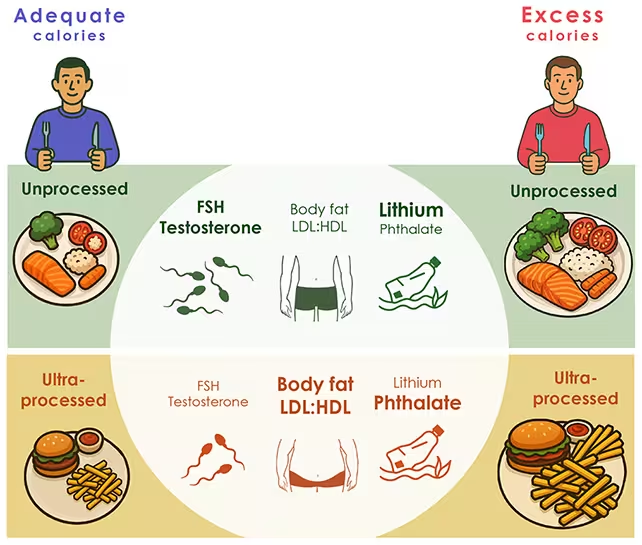7 Minutes
New evidence: three clear harms from ultra-processed foods
A randomized crossover dietary trial from the University of Copenhagen finds that ultra-processed foods (UPFs) can damage multiple aspects of men's health even when calorie and nutrient intake are held constant. The study identifies three principal effects linked to high UPF consumption: increased body fat, disruption of endocrine (hormonal) function, and impaired markers of sperm health. These outcomes add to a growing body of evidence that industrially manufactured foods may affect human biology beyond their macronutrient and caloric profiles.
The authors framed their work to test a specific question: does the industrial processing of food itself — rather than only the calories, macronutrients, or portion size — influence metabolic and reproductive health? Past epidemiological studies have correlated UPF intake with obesity, cardiovascular disease, and some cancers, but demonstrating causality requires controlled feeding trials such as this one.
Study design and primary findings
Trial structure
The trial enrolled 43 cisgender men aged 20 to 35 in a crossover design. Each participant followed two distinct diets separated by a three-month washout period. Both diets were mathematically matched for calories and nutrient composition, but differed markedly in the degree of processing: one delivered 77% of daily calories from ultra-processed foods, while the other supplied 66% of calories from unprocessed or minimally processed foods.

The researchers compared unprocessed vs ultra-processed diets. (Preston et al., Cell Metab., 2025)
Key physiological outcomes
Compared with the unprocessed diet, the UPF-rich diet produced measurable adverse changes over the intervention period. On average participants gained about 1 kilogram (2.2 pounds) of additional fat mass while on the UPF regimen. Biomonitoring further detected increased concentrations of a phthalate-related compound, cxMINP, in blood — a chemical class widely associated with plasticizers that can act as endocrine disruptors.
Importantly for reproductive health, the UPF diet was associated with reductions in circulating testosterone and in follicle-stimulating hormone (FSH), a pituitary hormone that supports spermatogenesis. The study also reported trends toward differential accumulation of contaminants in blood and seminal fluid, consistent with a pathway by which manufactured food packaging and additives may influence reproductive tissues.
"We were shocked by how many body functions were disrupted by ultra-processed foods, even in healthy young men," says molecular biologist Romain Barrès of the University of Copenhagen, one of the senior investigators. Nutrition scientist Jessica Preston, a co-author, adds: "Our results prove that ultra-processed foods harm our reproductive and metabolic health, even if they're not eaten in excess. This indicates that it is the processed nature of these foods that makes them harmful."
Scientific context and mechanisms
UPFs are defined by both their novel industrial ingredients (emulsifiers, artificial colors, stabilizers, many additives not typically found in home kitchens) and high-intensity manufacturing processes (extrusion, hydrogenation, packaging). Those attributes increase shelf life, palatability, and affordability but also introduce compounds and physical properties that may alter digestion, gut microbiota, endocrine signaling, and exposure to chemical contaminants.
Potential mechanisms linking UPFs to the observed harms include:
- Hormone-mimicking contaminants: Phthalates and other plasticizers can leach from packaging or arise from processing equipment and interfere with androgen and pituitary signaling.
- Food matrix changes: Processing alters fiber structure, particle size, and the release kinetics of nutrients, potentially promoting adiposity and affecting satiety hormones.
- Additive-induced inflammation: Certain emulsifiers and additives have been shown in animal and in vitro models to promote low-grade inflammation and gut barrier changes, which may contribute to metabolic dysregulation.
While this human trial cannot isolate every mechanism, it provides controlled evidence that two diets equal in calories and nutrient labels can produce divergent metabolic and reproductive outcomes when processing level differs.
Implications, limitations and public-health relevance
This trial strengthens the hypothesis that the degree of industrial processing itself is a determinant of health, independent of energy intake. For clinicians and public-health policymakers, the results signal the need to incorporate UPF exposure into dietary guidance and to reassess food manufacturing standards and packaging practices that increase human exposure to endocrine-disrupting chemicals.
However, limitations are important to note: the sample size was modest (43 participants), the intervention periods were relatively short, and the study included only young men. Longer trials and more diverse populations (including women, older adults, and adolescents) are required to evaluate chronic disease risk and generalizability. The study also raises questions for future research on intermediate endpoints such as gut microbiome changes, inflammatory biomarkers, and longer-term fertility measures.
Expert Insight
Dr. Elena Morales, a reproductive endocrinologist not involved in the study, comments: "This trial is one of the cleanest demonstrations yet that how food is processed can have immediate physiological consequences. The drop in testosterone and FSH — hormones that are central to male reproductive function — is particularly concerning given global trends toward lower semen quality. Clinicians should consider patients' UPF intake when evaluating unexplained metabolic or reproductive changes."
Dr. Marco Jensen, a food-systems researcher, adds: "From a systems perspective, UPFs emerged as a solution for affordability and distribution. But science is now catching up to show trade-offs for population health and environmental sustainability. Reducing ultra-processed food consumption while improving access to affordable, minimally processed alternatives is a policy priority."
Practical takeaways
For individuals: prioritize whole or minimally processed foods — vegetables, fruits, legumes, whole grains, minimally processed dairy, fish and lean meats — and limit packaged snacks, ready meals, and products with long ingredient lists dominated by unfamiliar chemical names.
For researchers and regulators: the study highlights the need for stricter monitoring of food-contact chemicals, better labeling of processing level, and expanded trials that probe long-term reproductive and cardiometabolic outcomes.
Conclusion
This controlled trial from the University of Copenhagen indicates that ultra-processed foods can increase fat mass, elevate contamination markers linked to plasticizers, and lower key reproductive hormones in healthy young men — even when calories and basic nutrient content are matched. The findings reinforce growing scientific and policy interest in the role of food processing as an independent risk factor for metabolic and reproductive health. While further research is needed to confirm long-term and population-wide impacts, the study supports practical steps to reduce UPF intake and to re-evaluate manufacturing and packaging practices that may introduce endocrine-disrupting contaminants.
Source: sciencealert


Leave a Comment